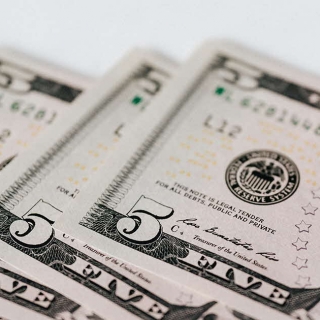


The dollar gained in early trading as investors sought to hedge against rising geopolitical risks following the U.S. attack on Iran.
The U.S. currency gained slightly against the euro and most other major currencies as markets began the week in Asia. Crude oil futures rose and U.S. equity contracts fell as the bombings stoked demand for security and concerns about energy supplies. Government bonds edged higher.
"We expect some risk relief, but not aggressively," said Diego Fernandez, chief investment officer at A&G Banco in Madrid. "The world may be a safer place without the Iranian nuclear threat, but we still need to see how Iran reacts and how the conflict evolves."
The market reaction has been generally muted since Israel's initial strikes on Iran earlier this month: Even after falling for the past two weeks, the S&P 500 is only about 3% below its all-time high from February. And a Bloomberg gauge of the U.S. dollar is up less than 1% since the June 13 attacks.
That's largely because investors expect the conflict to be localized, with no broader impact on the global economy. But the moves could be more significant if Iran responds to the latest developments with moves such as blocking the Strait of Hormuz, a key shipping route for oil and gas, or attacking U.S. forces in the region, market watchers said.
"It all depends on how the conflict develops, and things seem to be changing by the hour," said Evgenia Molotova, a senior investment manager at Pictet Asset Management. "The only way they will take it seriously is if the Strait of Hormuz is blocked because that would affect access to oil."
Iran has vowed to impose "lasting consequences" for the bombing and said it has every option to defend its sovereignty. Meanwhile, Israel has continued its attacks, targeting military sites in Tehran and western Iran.
"This marks a turning point for the market," said Charu Chanana, chief investment strategist at Saxo Markets in Singapore. "The question is whether U.S. assets can still command a premium as a safe haven asset." However, the decline is likely to be limited as some market participants have braced for a worsening conflict. The MSCI All Country World Index has fallen 1.5% since Israel attacked Iran on June 13. Fund managers have reduced their holdings, stocks are no longer overbought and demand for hedges has increased, meaning a major sell-off is unlikely at these levels. (alg)
Source: Bloomberg
The dollar fell due to disappointing US jobs data, with layoffs reaching more than 150,000 in October, the highest in over 20 years. Another factor: the market is now considering the possibility that...
The US Dollar trims losses on Friday with investors wary of risk following another sell-off on Wall Street, as concerns of an AI bubble remain alive. The USD Index, which measures the value of the Dol...
The U.S. dollar edged up on Wednesday, extending its gains from last week on doubts about the outlook for another Fed rate cut this year and as private payrolls data assuaged worries over the state of...
The US dollar held near a three-month high on Tuesday (November 4th) as a divided Federal Reserve prompted traders to reduce their bets on a rate cut, while the Japanese yen strengthened after a verba...
The US dollar held near a three-month high on Monday (November 3rd) ahead of economic data this week that will provide only vague clues about the health of the US economy and could reinforce the Feder...
Crude prices recovered from a midday dip on Friday on hopes Hungary can use Russian crude oil as U.S. President Donald Trump met Hungary's Prime Minister Viktor Orban at the White House. Brent crude futures settled at $63.63 a barrel, up 25 cents...
US stocks rebounded from early losses to close mostly higher on Friday amid hopes that Congress members were making progress toward ending the government shutdown. The S&P 500 and the Dow Jones closed 0.3% higher, while the tech-heavy Nasdaq...
European stocks fell on Friday as investors digested more quarterly earnings, but weekly losses were inevitable, with concerns regarding overheated valuations evident. The DAX index in Germany dropped 0.8% and the CAC 40 in France declined 0.2%,...
 European stocks fell on Friday as investors digested more quarterly earnings, but weekly losses were inevitable, with concerns regarding overheated...
European stocks fell on Friday as investors digested more quarterly earnings, but weekly losses were inevitable, with concerns regarding overheated...
 Two weeks before the US Federal Reserve's final meeting, with the federal government's data taps closed, Atlanta Fed staff bolstered their economic...
Two weeks before the US Federal Reserve's final meeting, with the federal government's data taps closed, Atlanta Fed staff bolstered their economic...
 Asian stocks slipped at the open on Friday (November 7), following a choppy session on Wall Street. The MSCI Asia Pacific Index fell about 0.2%, led...
Asian stocks slipped at the open on Friday (November 7), following a choppy session on Wall Street. The MSCI Asia Pacific Index fell about 0.2%, led...
 The Trump administration suspended docking fees for Chinese-built ships as part of a "trade truce" last month. The move has drawn criticism for...
The Trump administration suspended docking fees for Chinese-built ships as part of a "trade truce" last month. The move has drawn criticism for...